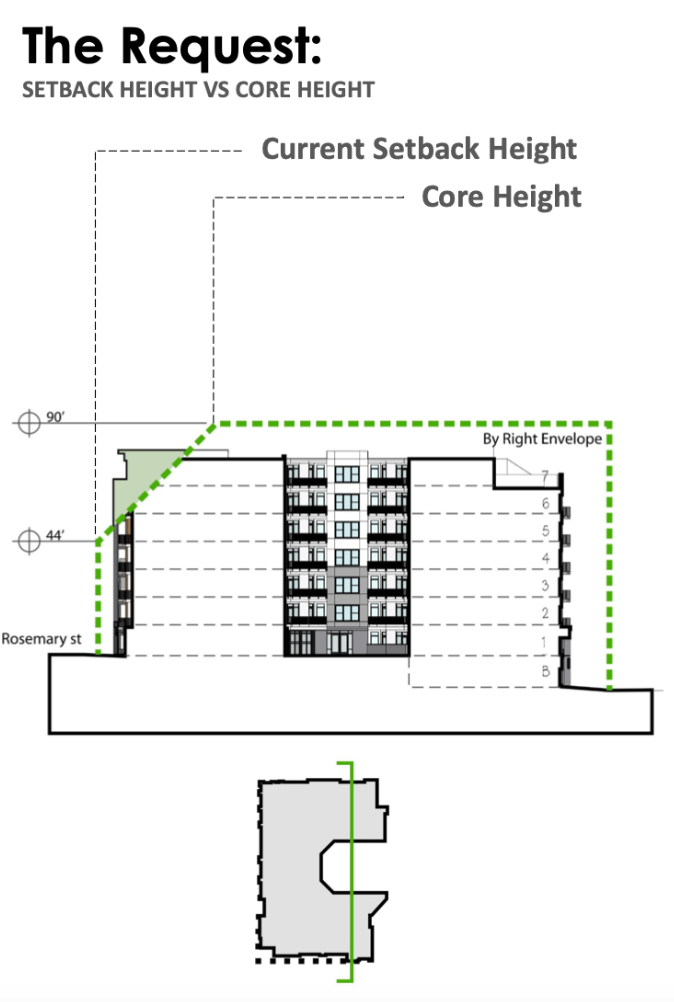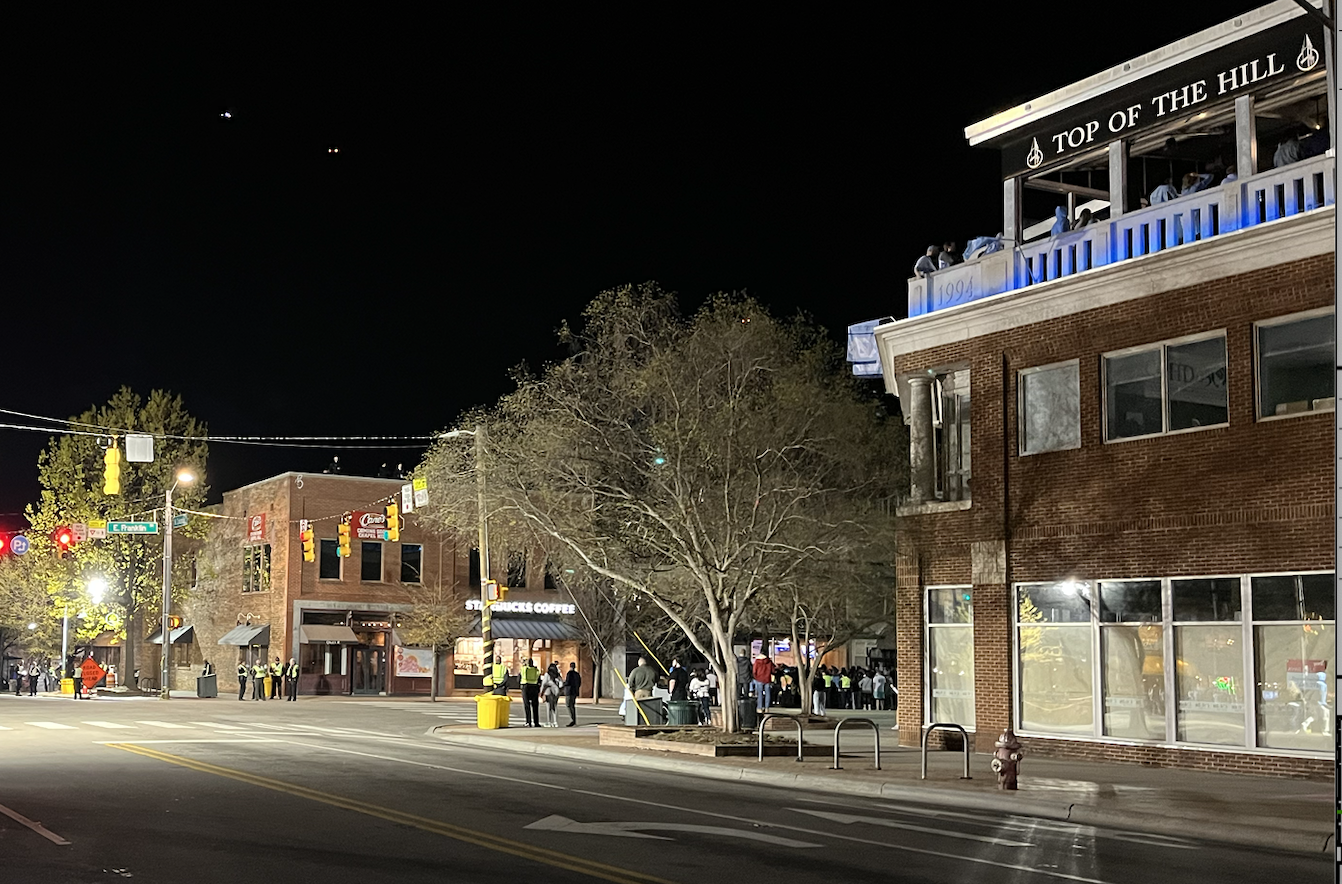After UNC’s men’s basketball team defeated Duke in the NCAA Final Four on Saturday, April 2, fans rushed Franklin Street. Photographers and television news crews captured an exuberant crowd, eager to celebrate their second victory in so many months over their biggest rival. While basketball isn’t everything in Chapel Hill, it’s nights like these that gives the town its reputation as an idyllic place.
But if you look closely at any of the thousands of images made that night, you’ll notice something amiss. At the intersection of Columbia and Franklin Street, the very center of downtown, there are three corner storefronts. All three of them are empty.*
If you didn’t know better, you would assume that Chapel Hill is in a place stricken with economic hardship. Perhaps there was a factory here, and now people are out of work after it closed. Or maybe it was a town where people made their living mining coal, only those jobs have disappeared. A fan of the Netflix series Outer Banks might think that Chapel Hill’s troubles might have something to do with overfishing in the Atlantic Ocean (remember, you can take the ferry to Chapel Hill). A more astute observer might think that the university moved elsewhere, with sports fans returning to the now empty town out of nostalgia.
If you instead learned that Chapel Hill is not dying, that its population continues to grow, and it sits in one of the most dynamic regions in the country, you would ask why, of all places, is downtown Chapel Hill suffering?
We could blame the pandemic. But visit other parts of town—Blue Hill, for example—and you’ll see a bustling business district, with almost every storefront open. Maybe it’s parking. But study after study shows that Chapel Hill has enough parking. Perhaps the town doesn’t want people to live downtown?
Surprisingly, your intuition is somewhat correct. While Chapel Hill, with support of the Town Council, is making some efforts toward reviving downtown, adding office space, building a parking deck, and working with UNC to relocate their visitor’s center to Franklin Street, the Council seems unsure whether they want anyone to, well, live downtown. In recent years, they’ve rejected proposals to build apartments in and near downtown, even while they’ve been eager to build housing elsewhere.
Will Chapel Hill Approve More Housing Downtown?
This week, the Council will hear a revised proposal from a developer (Grubb Properties, who is also building the town’s new parking deck and a new office building) to build a 150-unit apartment building on the corner of Rosemary and Columbia. The seven-story building will have no on-site parking, which means that apartments there will be cheaper than those that incorporate the high cost of parking (up to $40,000/space for a spot in a parking deck) into their rents. These will be small apartments—mostly studios and one bedrooms—and will be priced to be affordable to the people who work early- and mid-career jobs at UNC.
While this project won’t by itself solve our housing crisis, it will allow a few hundred more people to live and work downtown. Adding a few hundred year-round residents will also make it easier for businesses downtown to survive.
In addition, this building will pay more in taxes than its residents will consume in services. Not one tree will be cut down, and the nondescript building (a former bank) currently on the site has been empty for many years and will be torn down. Residents will be near thousands of jobs, dozens of restaurants, a Target, and a bus ride away from downtown Durham or Raleigh. And yet, the Council will hear the project for the third time tomorrow night, and won’t make a final decision until September. Why is the Council being so tough on a good project? While there are many factors, here’s three reasons:
- The town’s rules make it hard to build downtown.
If you look at the materials submitted by the applicant, you’ll notice this chart:

Current zoning includes what are called stepbacks, which requires developers to set their building back from the street, like a staircase, as it goes up in height. Stepbacks make it more expensive to build projects, as the developer must remove square footage in order to accommodate them. In this case, the developer is asking for an exemption from this rule (called a “variance”), most likely because the project wouldn’t be financially feasible otherwise.
The council also places other restrictions, like height, on buildings downtown that prevent projects from even being proposed. Of the ten tallest buildings in Chapel Hill, only one was built this century (Greenbridge), and most of the others were built by UNC, which doesn’t have to follow the town’s rules.
- When a developer asks for an exception to a rule, the Council asks for too much.
Once a developer decides to ask for a variance, the Council has the upper hand because the zoning is now “discretionary” (based on the whims of the Council) rather than “by right” (following the rules the council set in advance).
The Council can ask a developer to modify the appearance of a building, to change the layout, to build more parking, to require that they lower the rent for some apartments to be affordable to people at different incomes, or any number of other things. While some of these goals are admirable, they all make the project more expensive to build. Developers, like restaurateurs and grocery store owners, are in the business of making money. If they can’t make a profit building in Chapel Hill, they won’t build at all, which is one reason why there are so many vacant buildings and underused lots downtown.
- The council is too focused on individual projects. They need to think about the big picture.
Grubb purchased the .64 acre former bank in May 2021, paying $4.8 million, and first proposed building an apartment on the site last August. Since then, the project has gone through various advisory boards, each of which gave their input. The town’s planning commission and the transportation advisory board were unanimous in their approval for the building, and passed on a few minor suggestions to the Council. In normal circumstances, this would mean quick approval of the project.
It wasn’t until late April that the Council started expressing concern about whether the building included street-level retail space. One only has to walk around downtown to realize that retail spaces are not in high demand at the moment. Why would we force a developer to build more retail space when nearby storefronts are empty? Shouldn’t we be thinking about the overall environment, rather than asking every building to provide all the things we need? While the Town Council’s other concerns—about parking, and affordable housing—have slightly more merit, the fact that the Council is reviewing the project at all is a policy failure.
A successful downtown begins with the people who work here.
While this is just one project, the Town Council seems to be embracing a strategy that pretends as if UNC and UNC Hospitals are not our town’s two largest employers. They are happy to support new office space downtown, and to spend tens of millions of dollars to subsidize parking costs for the non-university employees who will work there. They offer incentives to companies who promise to bring jobs downtown, but introduce roadblock after roadblock when it comes to building housing for the people who already work in our community.
We have a housing crisis in Chapel Hill, not an employment crisis. We must address climate change by supporting housing downtown, not worry about the false perception that we don’t have enough parking. We need to support local business, not create a retail climate that’s so difficult that only chain restaurants have a chance to succeed. (And even then, many still fail.).
The Town of Chapel Hill needs a new downtown strategy. The Town Council should start by approving this apartment building.
What can you do?
Write town council and tell them that you support more housing downtown. Or you can speak in favor of this project at tomorrow night’s meeting.
* To be fair, one storefront will soon have a Raising Cane’s, a fast food restaurant more appropriate for an interstate exit than prime real estate.
Update: Matt Gladdek, executive director of the Chapel Hill Downtown Partnership, had this to say. Join him in supporting 101 E. Rosemary (the 150-unit apartment building discussed in this post):


